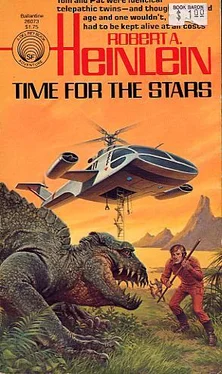Robert Heinlein - Time For The Stars
Здесь есть возможность читать онлайн «Robert Heinlein - Time For The Stars» весь текст электронной книги совершенно бесплатно (целиком полную версию без сокращений). В некоторых случаях можно слушать аудио, скачать через торрент в формате fb2 и присутствует краткое содержание. Жанр: Фантастика и фэнтези, на английском языке. Описание произведения, (предисловие) а так же отзывы посетителей доступны на портале библиотеки ЛибКат.
- Название:Time For The Stars
- Автор:
- Жанр:
- Год:неизвестен
- ISBN:нет данных
- Рейтинг книги:3 / 5. Голосов: 1
-
Избранное:Добавить в избранное
- Отзывы:
-
Ваша оценка:
- 60
- 1
- 2
- 3
- 4
- 5
Time For The Stars: краткое содержание, описание и аннотация
Предлагаем к чтению аннотацию, описание, краткое содержание или предисловие (зависит от того, что написал сам автор книги «Time For The Stars»). Если вы не нашли необходимую информацию о книге — напишите в комментариях, мы постараемся отыскать её.
Time For The Stars — читать онлайн бесплатно полную книгу (весь текст) целиком
Ниже представлен текст книги, разбитый по страницам. Система сохранения места последней прочитанной страницы, позволяет с удобством читать онлайн бесплатно книгу «Time For The Stars», без необходимости каждый раз заново искать на чём Вы остановились. Поставьте закладку, и сможете в любой момент перейти на страницу, на которой закончили чтение.
Интервал:
Закладка:
VI TORCHSHIP "LEWIS AND CLARK"
I was in Switzerland only two days. I got a quick look at the lake at Zurich and that was all; the time was jammed with trying to hurry me through all the things Pat had been studying for weeks. It couldn't be done, so they gave me spools of minitape which I was to study after the trip started.
I had one advantage: Planetary League Auxiliary Speech was a required freshman course at our high school—P-L lingo was the working language of Project Lebensraum. I can't say I could speak it when I got there, but it isn't hard. Oh, it seems a little silly to say "goed" when you've always said "gone" but you get used to it, and of course all technical words are Geneva-International and always have been.
Actually, as subproject officer Professor Brunn pointed out, there was not a lot that a telepathic communicator had to know before going aboard ship; the principal purpose of the training center had been to get the crews together, let them eat and live together, so that the psychologists could spot personality frictions which had not been detected through tests.
"There isn't any doubt about you, son. We have your brother's record and we know how close your tests come to matching his. You telepaths have to deviate widely from accepted standards before we would disqualify one of you."
"Sir?'
"Don't you see? We can turn down a ship's captain just for low blood sugar before breakfast and a latent tendency to be short tempered therefrom until he has had his morning porridge. We can fill most billets twenty times over and juggle them until they are matched like a team of acrobats. But not you people. You are so scarce that we must allow you any eccentricity which won't endanger the ship: I wouldn't mind if you believed in astrology—you don't, do you?"
"Goodness, no!" I answered, shocked.
"You see? You're a normal, intelligent boy; you'll do. Why, we would take your twin, on a stretcher, if we hadto ."
Only telepaths were left when I got to Zurich. The captains and the astrogation and torch crews had joined the ships first, and then the specialists and staff people. All the "idlers" were aboard but us. And I hardly had time to get acquainted even with my fellow mind readers.
They were an odd bunch and I began to see what Professor Brunn meant by saying that we freaks had to be allowed a little leeway. There were a dozen of us—just for the Lewis and Clark, I mean; there were a hundred and fifty for the twelve ships of the fleet, which was every telepathic pair that LRF had been able to sign up. I asked one of them, Bernhard van Houten, why each ship was going to carry so many telepaths?
He looked at me pityingly. "Use your head, Tom. If a radio burns out a valve, what do you do?"
"Why, you replace it."
"There's your answer. We're spare parts. If either end of a telepair dies or anything, that 'radio' is burned out, permanently. So they plug in another one of us. They want to be sure they have at least one telepair still working right up to the end of the trip... they hope."
I hardly had time to learn their names before we were whisked away. There was myself and Bernhard van Houten, a Chinese-Peruvian girl named Mei-Ling Jones (only she pronounced it "Hone-Ace"), Rupert Hauptman, Anna Horoshen, Gloria Maria Antonita Docampo, Sam Rojas, and Prudence Mathews. These were more or less my age. Then there was Dusty Rhodes who looked twelve and claimed to be fourteen. I wondered how LRF had persuaded his parents to permit such a child to go. Maybe they hated him; it would have been easy to do.
Then there were three who were older than the rest of us: Miss Gamma Furtney, Cas Warner, and Alfred McNeil. Miss Gamma was a weirdie, the sort of old maid who never admits to more than thirty; she was our triplet. LRF had scraped up four sets of triplets who were m-r's and could be persuaded to go; they were going to be used to tie the twelve ships together into four groups of three, they the groups could be hooked with four sets of twins.
Since triplets are eighty-six times as scarce as twins it was surprising that they could find enough who were telepathic and would go, without worrying about whether or not they were weirdies. I suspect that the Misses Alpha, Beta, and Gamma Furtney were attracted by the Einstein time effect; they could get even with all the men who had not married them by not getting older while those men died of old age.
We were a "corner" ship and Cas Warner was our side, wise twin, who would hook us through his twin to the Vasco da Gama, thus linking two groups of three. Other sidewise twins tied the other comers. The ones who worked ship-to-ship did not have to be young, since their twins (or triplets) were not left back on Earth, to grow older while their brothers or sisters stayed young through relativity. Cas Warner was forty-five, a nice quiet chap who seemed to enjoy eating with us kids.
The twelfth was Mr. ("Call me 'Uncle Alfred' ") McNeil, and he was an old darling. He was a Negro, his age was anything from sixty-five on up (I couldn't guess), and he had the saintliness that old people get when they don't turn sour and self-centered instead... to look at him you would bet heavy odds that he was a deacon in his church.
I got acquainted with him because I was terribly homesick the first night I was in Zurich and he noticed it and invited me to his room after supper and sort of soothed me. I thought he was one of the Foundation psychologists, like Professor Brunn—but no, he was half of a telepair himself . , .and not even a sidewise twin; his partner was staying on Earth.
I couldn't believe it until be showed me a picture of his pair partner—a little girl with merry eyes and pigtails—and I finally got it through my thick head that here was that rarity, a telepathic pair who were not twins. She was Celestine Regina Johnson, his great-niece—only be called her "Sugar Pie" after he introduced me to the photograph and had told her who I was.
I had to pause and tell Pat about it, not remembering that he had already met them.
Uncle Alfred was retired and had been playmate-in-chief to his baby great-niece, for he had lived with his niece and her husband. He had taught the baby to talk. When her parents were both killed in an accident he had gone back to work rather than let the child be adopted. "I found out that I could keep tabs on Sugar Pie even when I couldn't see her. She was always a good baby and it meant I could watch out for her even when I had to be away. I knew it was a gift; I figured that the Lord in His infinite mercy had granted what I needed to let me take care of my little one."
The only thing that had worried him was that he might not live long enough; or, worse still, not be able to work long enough, to permit him to bring up Sugar Pie and get her started right. Then Project Lebensraum had solved everything. No, he didn't mind being away from her because be was not away from her; he was with her every minute.
I gathered an impression that he could actually see her but I didn't want to ask. In any case, with him stone walls did not a prison make nor light-years a separation. He knew that the Infinite Mercy that had kept them together this long would keep them together long enough for him to finish his appointed task. What happened after that was up to the Lord.
I had never met anybody who was so quietly, serenely happy. I didn't feel homesick again until I left him and went to bed. So I called Pat and told him about getting acquainted with Uncle Alfred. He said sure, Uncle All was a sweet old codger... and now I should shut up and go to sleep, as I had a hard day ahead of me tomorrow.
Then they zoomed us out to the South Pacific and we spent one night on Canton Atoll before we went aboard They wouldn't let us swim in the lagoon even though Sam had arranged a picnic party of me and himself and Mei-Ling and Gloria; swimming was one of the unnecessary hazards. Instead we went to bed early and were awakened two hours before dawn—a ghastly time of day, particularly when your time sense has been badgered by crossing too many time zones too fast. I began to wonder what I was doing there and why?
Читать дальшеИнтервал:
Закладка:
Похожие книги на «Time For The Stars»
Представляем Вашему вниманию похожие книги на «Time For The Stars» списком для выбора. Мы отобрали схожую по названию и смыслу литературу в надежде предоставить читателям больше вариантов отыскать новые, интересные, ещё непрочитанные произведения.
Обсуждение, отзывы о книге «Time For The Stars» и просто собственные мнения читателей. Оставьте ваши комментарии, напишите, что Вы думаете о произведении, его смысле или главных героях. Укажите что конкретно понравилось, а что нет, и почему Вы так считаете.












